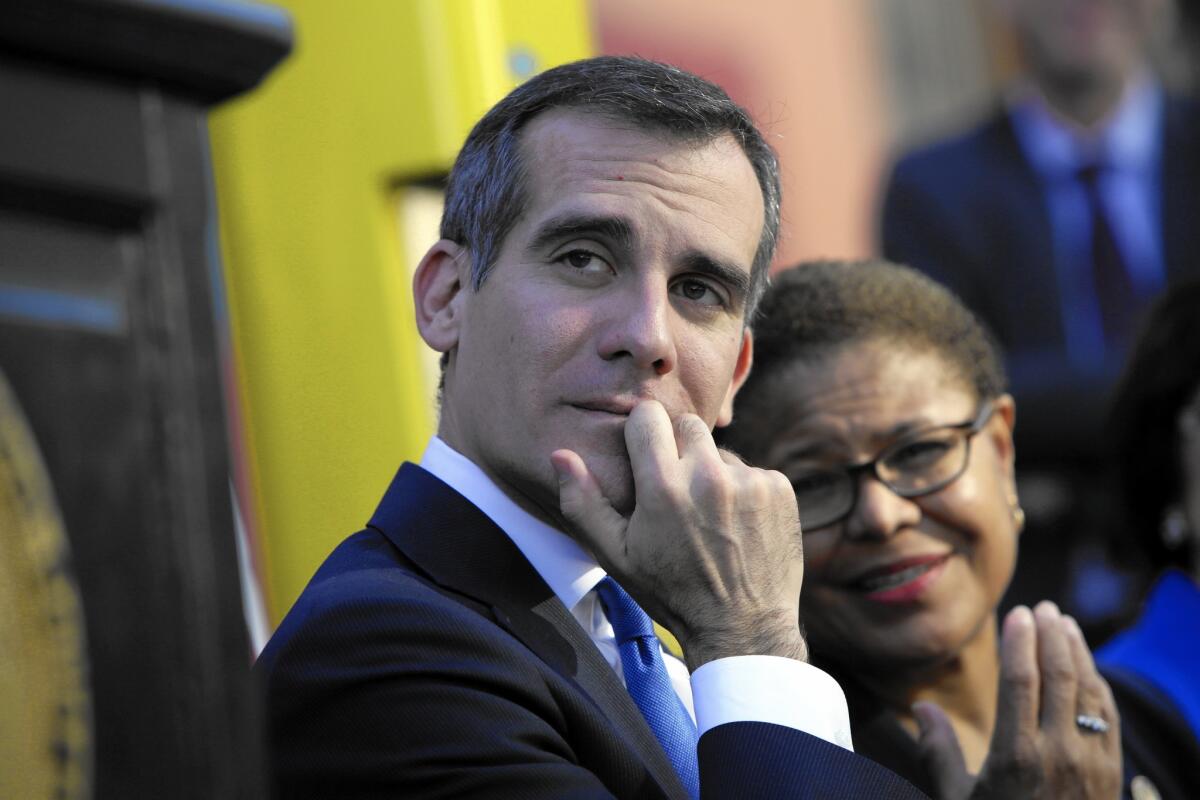Eric Garcetti’s Mayor’s Fund lets companies give big

When Eric Garcetti won the 2013 mayoral election, he did so without the financial backing of Psomas, a Los Angeles-based engineering firm with offices throughout the Southwest. As a company that held contracts worth more than $100,000 with the city, Psomas was barred from contributing to candidates for city office under a campaign finance law that Garcetti himself wrote as a councilman.
But at a panel discussion on restoring the Los Angeles River hosted by the mayor at his home last year, Psomas President Jacob Lipa picked up a brochure that highlighted a novel way to support Garcetti: the newly formed Mayor’s Fund for Los Angeles, a nonprofit that Garcetti founded to bolster city services and advance key parts of his agenda.
The fund offered Psomas an opportunity to make a tax-deductible donation toward restoration of the river. It was also a chance to align the company with L.A.’s top elected official. In September, Psomas donated $10,000 to the Mayor’s Fund. A company attorney concluded gifts to the nonprofit aren’t subject to the same restrictions as political contributions, Chief Executive Ryan McLean said.
“We can’t support his campaign,” McLean said of Garcetti. “So this is something we could support.”
The contribution is one of dozens the Mayor’s Fund has received, from companies with a stake in City Hall decisions and from charitable foundations, according to records reviewed by The Times. Modeled on similar nonprofits in New York and other cities, the fund provides a financial boost for civic programs — as diverse as environmental initiatives and summer jobs for thousands of inner-city kids — that might otherwise fall victim to city belt-tightening.
But the nonprofit, which took in about $5.2 million between its formation in June and last month, can also offer a discreet destination for special-interest money that is not subject to campaign finance restrictions. City law caps contributions by individuals or businesses at $1,300 per election for mayoral candidates. By contrast, the average donation to the Mayor’s Fund has been $111,000.
“To the extent that we’re worried about groups or individuals or companies or unions being able to curry favor with elected officials, it does raise concerns,” said Richard Hasen, a professor at the UC Irvine School of Law who studies campaign finance regulation.
Senior Garcetti aide Rick Jacobs, a board member and treasurer for the nonprofit, said the fund has an “impeccably independent” board overseeing its activities that would guard against inappropriately close association with the mayor’s office. He noted that the Annenberg Foundation, the California Endowment and other philanthropic groups have been financial supporters, alongside businesses and city contractors.
The donors’ common interest is “to see the world made a better place,” Jacobs said. So far the fund has spent more than $1.8 million on youth programs alone, officials at the nonprofit said.
There are no limits on the amounts Garcetti and other elected officials can seek for nonprofits such as the Mayor’s Fund, although they must disclose donations in excess of $5,000 to the city’s Ethics Commission. Those records show that Garcetti’s fund has benefited from donations of as much as $1 million from prominent charities as well as manufacturing, engineering, telecommunications, software and financial firms, or foundations linked to those companies.
The contributors include large banking corporations and their charitable affiliates — which made up about 20% of the fund’s contributions — and Walt Disney Co. — which donated $1 million in June to support programs that offer jobs and neighborhood activities to young Angelenos.
Special interests have a long record of supporting politicians’ pet charities. Former Mayor Antonio Villaraigosa raised money for the Partnership for Los Angeles Schools, a nonprofit that worked to advance his vision of a public schools overhaul, and other groups.
The Mayor’s Fund is different because it promotes a broader range of initiatives on Garcetti’s agenda. Some donors to the fund said they had enjoyed one-on-one meetings with the mayor and dinner receptions at his official residence, the Tudor-style Getty House mansion in Hancock Park.
Walter Wang, chief executive of JM Eagle, the world’s largest plastic pipe manufacturer, said Jacobs made a trip to his office last year to seek his support. Afterward, he said, he met with Garcetti at City Hall. Wang ultimately gave $200,000 in July through his foundation and promised to contribute $1 million over the next five years.
He said that although he supports the fund’s philanthropic goals — his initial donation was earmarked for summer activities for teenagers at risk of joining gangs — he also saw the gift as a way to forge bonds with Garcetti. During conversations with the mayor, Wang said, he expressed his view that plastic pipes like those manufactured by his company could withstand an earthquake better than the metal pipes used by the city’s Department of Water and Power.
“We need to have relationships with government leaders,” he said. “We want to influence the government leaders to make the right decisions so that we can be more competitive.”
Garcetti said that he met several times with Wang, including at least one meeting unrelated to the Mayor’s Fund. After the contribution, Garcetti said, Wang has “never asked for anything in return, nor should he expect anything.”
The fund’s donors include at least one company that Garcetti openly criticized while campaigning for mayor: retailer Wal-Mart, which gave $100,000 three months ago. In 2012, Garcetti said he would refuse any campaign contributions from Wal-Mart because of the company’s treatment of its employees.
A Wal-Mart spokeswoman said in an email that the company’s donation was directed toward L.A. anti-gang initiatives it had supported since 2011. Garcetti directed questions about the Wal-Mart donation to the nonprofit. He said he was unaware of the company’s donation to the fund until The Times inquired about it, although he acknowledged signing an Ethics Commission disclosure form indicating the contribution came at his “behest.”
Garcetti said he has routinely signed such paperwork, not because he personally solicited the money from donors, but to open contributions to public review. “I rarely ask anybody for money at all for this. That’s something the fund does. But we decided in an abundance of caution to report it as if I had,” he said.
Garcetti said he would take no position on whether his fund should have accepted Wal-Mart’s money because such decisions should be made by the board. “I can’t dictate that,” he said. “If I get into that business, then that threatens [board members’] independence.”
Asked about potential conflicts of interest caused by city contractors or other businesses supporting the fund, Garcetti said that he keeps his distance from the organization’s operations and that donors are dealt with by the nonprofit’s staff. “This is not run by me,” he said.
But distinguishing the mayor’s office from the Mayor’s Fund isn’t always easy.
Several donors said they were courted directly by Jacobs, who created an independent committee that raised more than $2 million for Garcetti during the mayoral election. The fund’s four employees work from a City Hall office, and its president, Deidre Lind, spoke to the Times in an interview that was arranged and monitored by a mayoral press aide.
“Just as we get space on loan from the city, we get communications support” from Garcetti’s staff, Lind said. She said such assistance doesn’t compromise the fund’s independence or transparency with the public.
Doug White, director of Columbia University’s graduate program in fundraising management, said such overlap raises questions about the fund’s management. Information about a nonprofit shouldn’t be channeled through a politician’s office, he said.
Because of the nonprofit’s association with government, he said, its officers and directors should be particularly attentive to maintaining independence.
“It’s the same as any other charity, legally,” White said. “But because of its peculiar place in Los Angeles society, it needs to have a higher standard.”
More to Read
Start your day right
Sign up for Essential California for news, features and recommendations from the L.A. Times and beyond in your inbox six days a week.
You may occasionally receive promotional content from the Los Angeles Times.









